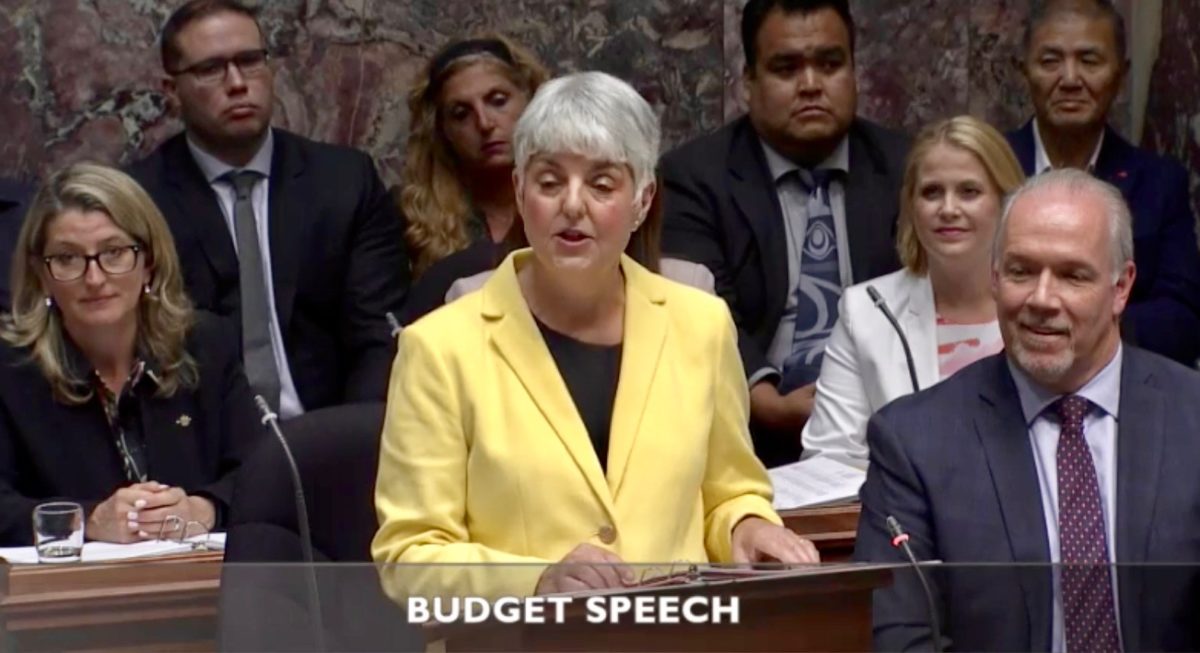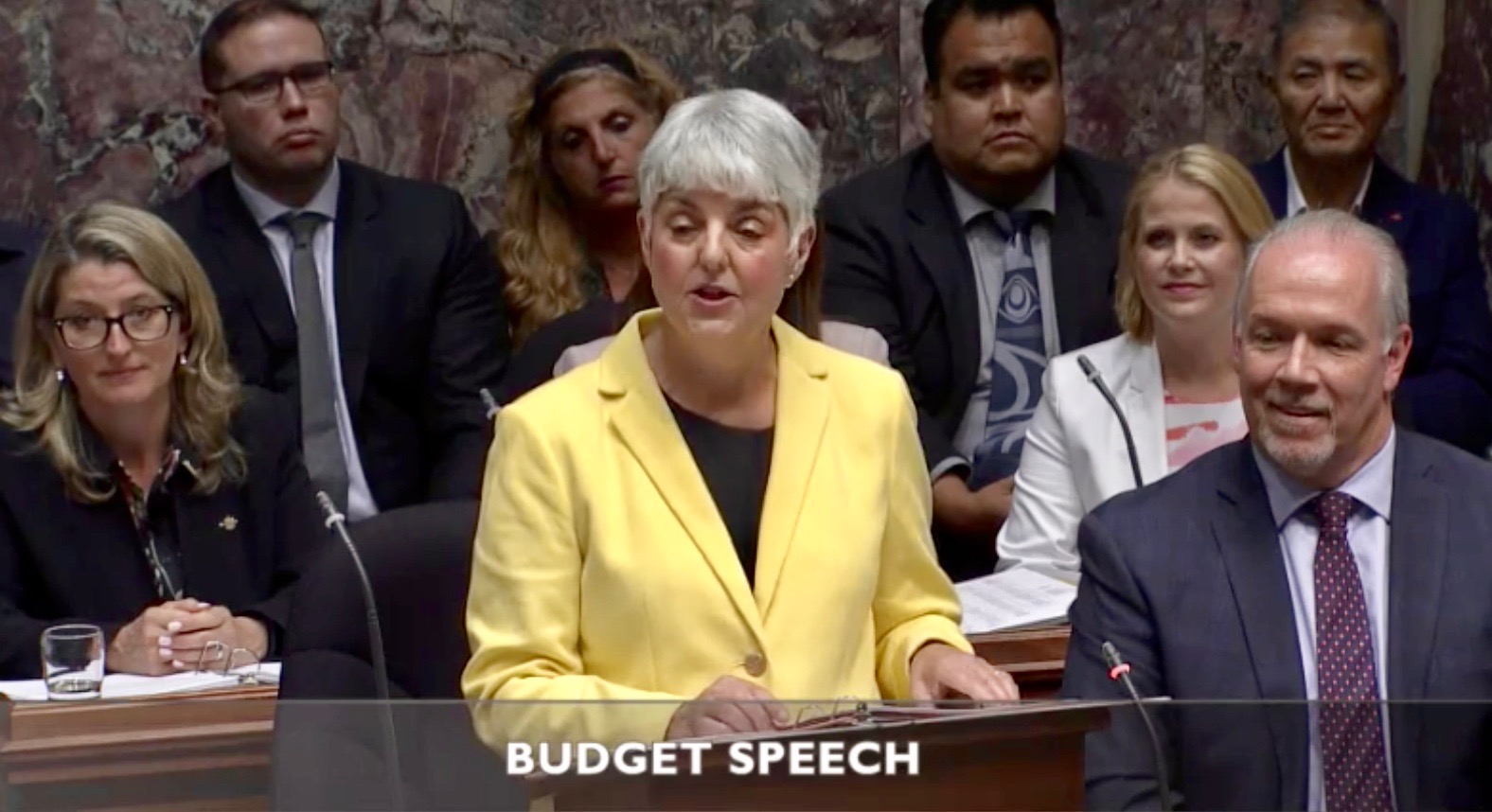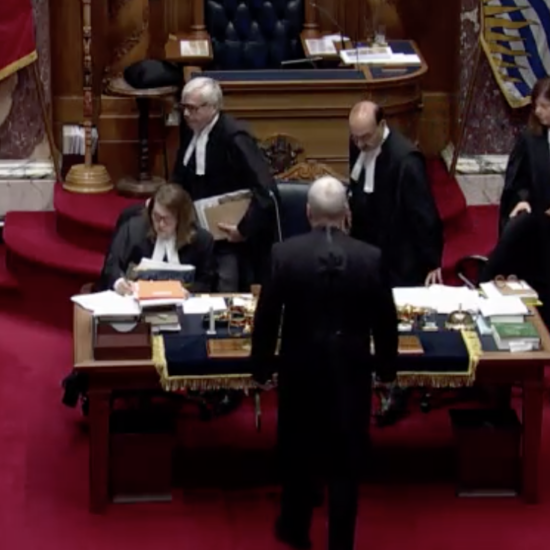
Bob Mackin
Cut the NDP some slack. But don’t let them enjoy a long leash.
Finance Minister Carole James’s Sept. 11 budget update came on the 56th day since the July 18 swearing-in. A rather ambitious summer project.
Just like Gary Collins’s speech on July 30, 2001, when the BC Liberal mini-budget was packed heavy with a bevy of promised tax cuts for individuals and industry.
The Gordon Campbell Liberals were able to get to work quicker, only because they won 77 of 79 seats in

James delivering the first NDP budget since 2001 (Hansard TV)
the May 16, 2001 election. It took three weeks before B.C.’s 2017 vote was settled and then most of the next month as the minority BC Liberals unsuccessfully tried every which way to Sunday to hang-on to power and force another election. Christy Clark’s gamble flopped on a Thursday night.
Back in 2001, Collins aggressively commenced a red-tape cutting agenda, which eventually included an about-face on key promises, such as stopping the expansion of gambling and not selling BC Rail. Decisions that still haunt the Liberals.
James’s plan was more detailed and complex than Collins’s, but it contained notable omissions.
John Horgan’s NDP campaigned aggressively to bring $10-a-day childcare and a $400 credit for renters, neither of which were in the budget. James said they’re coming, but didn’t say when. Student loan relief and BC Hydro rate freezes were promised. So were BC Ferries fare rollbacks. The wait is on for those as well.
The NDP is spending $208 million for 1,700 new rental units and $291 million for 2,000 modular housing units for homeless. But that leaves more than 110,000 to build.
There is $681 million more for Kindergarten to Grade 12 over three years, including the hiring of 3,500 teachers (as the Supreme Court of Canada told the BC Liberals to do). There is also $189 million to improve seniors’ home and residential care and $322 million to battle the fentanyl crisis: prevention, early intervention, treatment and recovery.
To pay for it, James hiked personal income taxes from 14.7% to 16.8% for $150,000-plus earners, and hiked corporate income taxes from 11% to 12%, but dropped small business taxes from 2.5% to 2%.
The AdvantageBC corporate welfare program is over and the BC HOME Partnership mortgage program is under review. The Liberals are predictably outraged, as outraged as a party that decided June 22 to support key planks of the NDP platform can be.
That James’s speech was on the 16th anniversary of the 9/11 terrorist attacks was a reminder of the curveballs governments face. Campbell’s cabinet met Sept. 12, the day after the tragedy, and the minutes (obtained by theBreaker) show that Campbell and co. discussed “the global slowown, the impact of the softwood lumber tariff, the events of September 11 on the U.S. economy and Crown corporation losses are all contributing to a scenario of weak economic growth.”
The NDP in 2017 faces the twin challenges of the fentanyl overdose crisis and wildfires (the cost of fire management has zoomed from $63.16 million to a whopping $506.3 million).
The softwood lumber tariff is back and the B.C. economy relies more on buying, selling and building houses than natural resources. Interest rates could be going up and Hurricanes Harvey and Irma are bound to have economic ripple effects for weeks and months to come.
The NDP has a long social and economic “to do list,” but there is another list they can and should act quicker to fulfil. Governance, itself.
Last Friday’s throne speech committed to changing fixed election dates to fall, beginning in 2021, amending lobbying laws to restrict former public office holders from profiting, and a referendum on proportional representation. All good ideas. Originally conceived for during the province wide municipal elections vote next October, it may happen a tad later and by mail-in vote. The throne speech says “no later than November 2018.”
British Columbians should be worried about other promised democratic reforms that look like they will get pushed beyond the first 100 days.
The party’s election platform said: “We’ll work with the auditor general to set strong standards for advertising spending. We’ll protect whistleblowers, strengthen conflict-of-interest legislation and improve access to information rules.”
None of the four above measures appears in the throne speech.
The only thing in the “ending partisan waste and opening up government” section that the NDP has delivered is the announcement to bring back the B.C. Human Rights Commission.











